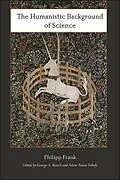Philipp Frank (1884-1966) was an influential philosopher of science, public intellectual, and Harvard educator whose last book, The Humanistic Background of Science, is finally available. Never published in his lifetime, this original manuscript has been edited and introduced to highlight Frank's remarkable but little-known insights about the nature of modern science-insights that rival those of Karl Popper and Frank's colleagues Thomas Kuhn and James Bryant Conant. As a leading exponent of logical empiricism and a member of the famous Vienna Circle, Frank intended his book to provide an accessible, engaging introduction to the philosophy of science and its cultural significance. The book is steadfastly true to science; to aspirations of peace, unity, and human flourishing after World War II; and to the pragmatic philosophies of Charles S. Peirce, William James, and John Dewey that Frank embraced in his new American home. Amidst the many recent surveys and retrospective analyses of midcentury philosophy of science, The Humanistic Background of Science offers an original, first-hand view of Frank's post-European life and of intellectual dramas then unfolding in Chicago, New York City, and Boston.
Autorentext
George A. Reisch is managing editor of The Monist and the author of The Politics of Paradigms: Thomas S. Kuhn, James B. Conant, and the Cold War "Struggle for Men's Minds", also published by SUNY Press. Adam Tamas Tuboly is postdoctoral researcher at the Institute of Philosophy, Research Centre for Humanities, and research fellow at the Institute of Transdisciplinary Discoveries, Medical School, University of Pécs.
Inhalt
List of Illustrations
Chronology of Philipp Frank's Life
Philipp Frank: A Crusader for Scientific Philosophy
Part I
Chapter 1. Introduction: Science, Facts, and Values
1. Science and Poetry
2. Charges against the Monopoly of Science
3. Twentieth-Century Science and Philosophy
4. The "Real World" Is Not Describable
5. The Humanities Are Trailing behind the Natural Sciences
6. The "Special Sciences" Don't Exhaust "Science"
7. Semantic and Pragmatic Components of Science
8. Philosophical Schools Woo the Support of Science
9. Principles of Science and Human "Values"
Chapter 2. The Longing for a Humanization of Science
1. Dissatisfaction with Nineteenth-Century Science
2. Emerson on the Changing Role of Science
3. Lord Herbert Samuel for Modern Science
4. Dehumanization of Science
5. Soviet Philosophy and Modern Science
6. The Birth of Modern Science Was the Birth of Dissatisfaction
7. Bacon on the Copernican System
8. How Science Has Been "Humanized"
9. Analogies as Humanizing Elements
10. "Humanization," "Metaphysics" and the "Inner Eye"
11. Metaphysics, Common Sense, and the Inner Eye
12. The Nature of Metaphysical Statements
13. The Inner Eye and Intuition
Chapter 3. Metaphysical Interpretations of Science
1. The Founder of Pragmatism on Science and Philosophy
2. Peirce's Conception of Philosophy
3. Metaphysics Nearer to Common Sense than Science
4. The Purpose of Metaphysical Interpretation
5. Metaphysics as Science
6. The Laws of Physics and Their Metaphysical Interpretation
7. How Scientists Have Interpreted Their Own Theories
Chapter 4. The Sociology of Metaphysical Interpretations
1. Can Science Be "Purged" of Philosophy?
2. Science and Chance Philosophies
3. The Attitudes of Scientists and Authorities
4. The Battle of Worldviews
5. Purging Physics and Metaphysics
6. Science and Reality
7. Max Planck and the Real World
8. Meanings and Examples of "Real"
9. Sociological Role of "Reality"
10. "Reality" in Soviet Philosophy
Chapter 5. Philosophy of Science and Political Ideology
1. Sociology of Knowledge
2. The General Sense of Ideology
3. Mannheim, Ideology, and Sociology of Knowledge
4. Forms of Social Influence
5. Facts and Interpretation
6. Sociology of Science
7. Social Class and Social Situation
8. The Solution to the Puzzle
Chapter 6. Sociology of Science and the Search for a Democratic Metaphysics
1. Validation and Theory Building
2. Science as a Compromise between Technology and Political Philosophy
3. The Scientific Conscience
4. Philosophical Interpretations and Democracy
5. The Physical and the Socio-cosmic Universe
Part II
Chapter 7. Scholastic Philosophy and Thomism
1. The Meanings of Rational and Intelligible
2. The Role of Philosophical Schools
3. Science and "Thomism"
4. The Thomistic Theory of Matter
5. The Social Significance of Thomistic Philosophy
6. On Angels and Genuine Laws
7. Thomism and Physical Laws
8. Analogical and Scientific Thinking
Chapter 8. The Physical Universe as a Symbol
1. The Moral Universe
2. Physical Science in the Bible
3. The Physical Universe and Human Behavior
4. Scholastic "Scientism" and Modern "Positivism"
5. Shifting the Problem to Revelation
6. Realism and Nominalism
7. The Situation in the Nineteenth and Twentieth Centuries
Chapter 9. Union, Divorce, and Reunion between Science and Philosophy
1. Science and Philosophy in the British and Soviet Encyclopedias
2. "Truce" through a Naturalization of Science
3. Attempts at a Reunion by a Positive Philosophy
4. The Role of "Sociology" in Positive Philosophy
5. The "Truth" of General Principles in Positive Philosophy
6. The Rel
